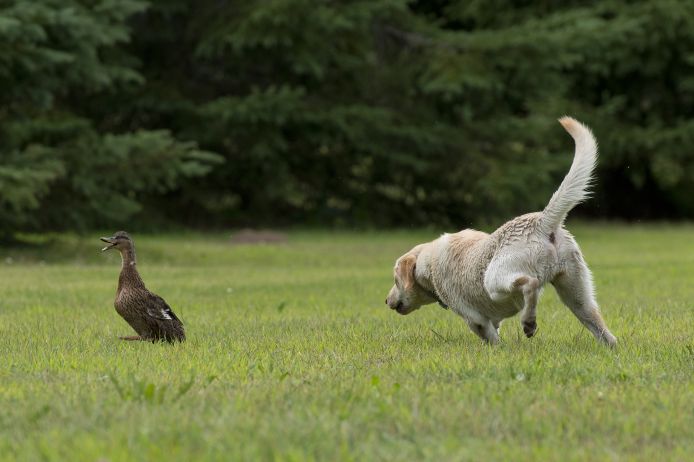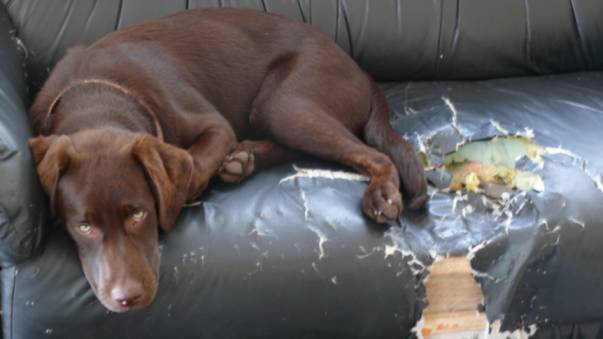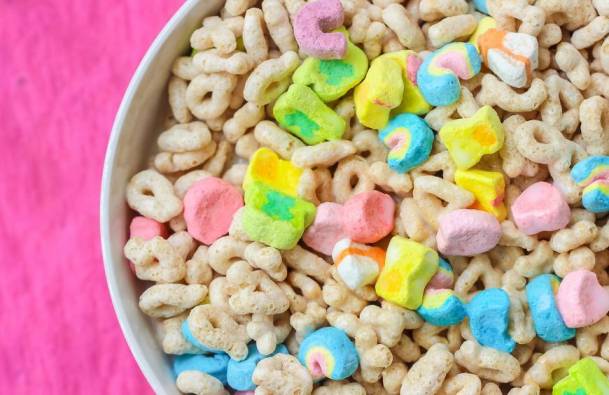Do you live in an area where there are plenty of wild birds, including ducks? Do you regularly walk in the area? If so, you may want to watch your dog to make sure he’s not eating duck poop. This could possibly make him sick.
Connect with a verified veterinarian in minutes. Licensed vets are available 24/7 to answer your questions. No need to worry about your furry family member.

Dogs Eating Poo is Normal
While it’s gross to us, dogs eat feces as a part of their normal behavior. This even has a medical term—it’s called coprophagia. There are many reasons that lead dogs to eat feces. Your dog may eat feces because they smell good to him, he may have an underlying medical condition causing changes in his appetite (such as a parasite infection), or it could be caused by a behavioral issue.
No matter the cause, eating any type of feces can make your dog sick, including duck poop.
Duck Poop Can Make Your Dog Sick
Duck feces, and other types of poop, can make your dog sick. When it comes to duck poop, it can be infected with harmful bacteria and parasites. One of the most common parasites found is Emieria spp Emieria spp is a type of parasite known as a coccidia, a single-celled organism that can cause gastrointestinal issues. Thankfully Emieria does affect dogs, though dogs can get other types of coccidial infection elsewhere.
Duck poop can contain other infectious agents such as Salmonella, E.coli, and Campylobacter, which we know are harmful to humans. Dogs are also at risk of contracting these infections, especially if they ingest it.

Review symptoms, medications & behavior to keep your pets healthy with a Vet Online in just minutes.
Ask a Vet Live NowTreatment For Dogs That Have Eaten Duck Poop
Treatment is only usually required if your dog starts showing clinical symptoms of an infection. Signs could include diarrhea, blood or mucus in the feces, vomiting, and changes in appetite. Your vet might suggest some tests, including fecal samples, to identify what infectious agent is causing the issue. The exact treatment will depend on this result.
Treatment depends on your dog’s symptoms and the vet’s diagnosis. Sometimes, the vet may prescribe sulfa-type antibiotics (such as sulfadimethoxine). This medication may be necessary if your dog needs prolonged treatment for this condition.
If your dog has severe diarrhea, he may be dehydrated and require other treatments/medications. For instance, the vet may give your dog intravenous fluids (IV). Other medications may be necessary, too, if the antibiotic does not clear up the infection.
In most cases, dogs will recover if they’ve received proper treatment early.
If your dog loves to snack on duck feces, then it’s probably a good idea to talk with the vet about this habit. Your dog may have some underlying health issues that cause him to go for feces in the first place. Your vet will have the best advice on how to deal with this issue.
Clean Up Your Dog’s Environment
Coccidia can stay infective in your dog’s environment for months. So, it’s essential to clean up your fur baby’s poop and clean the ground. This will keep your dog from becoming reinfected and keep other pets from becoming sick.
Cleaning up poop isn’t fun, we understand; however, you can clean it up with a bag and paper towels. In the house, you can use an antibacterial spray or bleach to kill remaining bacteria. It’s important to check with manufacturers before using these cleaning solutions on flooring (including wood, carpet, tiles, and more).
Prevent Infection
In the future, it’s a good idea to keep your dog away from all duck (and other bird) poop. If you keep ducks, you may want to consider fencing off part of the yard for your dog’s use. Be sure he stays in this area and does not have access to duck poop.
If you walk in an area where ducks live, keeping your dog on a short leash can prevent him eating duck and other poop.
These are effective methods you can use to keep your dog from eating duck poop and becoming re-infected!
Connect with a verified veterinarian in minutes. Licensed vets are available 24/7 to answer your questions. No need to worry about your furry family member.

Rebecca MacMillan, BVetMed BSAVA PGCertSAM MRCVS
This article has been reviewed and approved by an independent Veterinarian: Rebecca is a companion animal vet who has always had a passion for writing and client communication. Since her graduation from the Royal Veterinary college in 2009 she has gained a wealth of experience in first opinion small animal practice, in both clinical and managerial roles. She currently works in the South West and deals with a variety of routine and emergency appointments, but particularly enjoys medicine cases. Outside of work and writing, she enjoys spending time with her family, including her bouncy flat coated retriever George!
Review symptoms, medications & behavior to keep your pets healthy with a Vet Online in just minutes.
Ask a Vet Live Now





